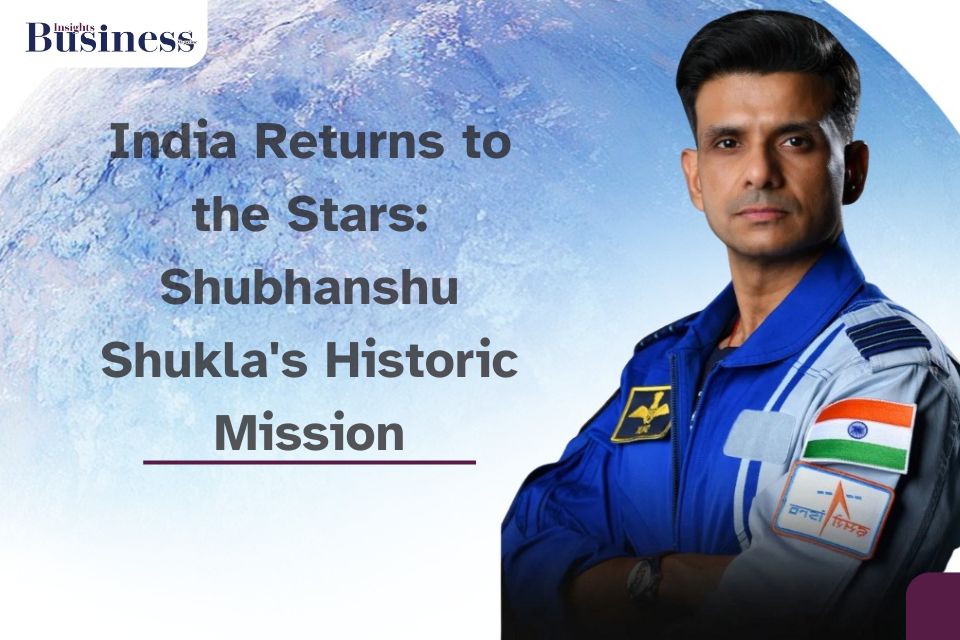In June 2025, the tricolor once again ascended into the stars—not merely as a symbol on a rocket; but through one man who carried with him, India’s hope, heritage, and hunger to explore. Shubhanshu Shukla, a former IAF test pilot, took a boarding pass to Axiom Mission 4, and became the first Indian in nearly forty years to go to space. His journey is not only a personal experience; but it represents a shift; India is no longer on the sidelines of the race into space. We are entering a new phase—an age where Indian astronauts, with international cooperation, a national interest, and motivated by the spirit of adventure, are travelling to space.
A Pilot’s Dream Beyond the Clouds
Shubhanshu Shukla’s trip to the stars involved steel nerves and supersonic speeds. As a decorated IAF officer, Shukla served as a test pilot, challenging operating limits and performance of aircraft safety. Such a rigorous background had to make him a natural selection for a space mission which demanded not only physical endurance but emotional endurance. Selected for Axiom Mission 4 (Ax-4), a private crewed mission operationalized by the U.S.-based Axiom Space in conjunction with NASA and SpaceX, Shukla trained with astronauts from the U.S., Turkey, and Italy, but his appointment certainly had context—he was carrying Rakesh Sharma’s banner forward, who had become India’s first astronaut in space in 1984. While Sharma flew on a Soviet Soyuz spacecraft, Shukla was a rider on the futuristic SpaceX Crew Dragon; while 40 years apart the two missions set themselves up as a start and a finish in a book that is just being rewritten.
India’s Emotional Connect to the Cosmos
What captured the imagination of millions wasn’t just the mission—it was the man behind it. Shukla’s farewell moment with his wife, Kamna Shukla, went viral on social media. Her heartfelt message, laced with pride and longing, echoed across platforms and added a deeply human layer to what might otherwise be viewed as a sterile technical feat.
“My third-grade classmate is going to space,” Kamna wrote on Instagram, speaking not only as a wife but as someone representing the collective awe of a nation. The couple’s story—from school friends to life partners—resonated with people across generations.
Adding to the emotional tapestry was Shukla’s mother, Asha Shukla, who proudly declared, “My son has taken the name of India to space.” Indeed, the image of Subhanashu doing a “namaskar” from orbit will be etched into the nation’s memory for years to come.
Moong Dal and Mango in Microgravity
Unlike traditional astronaut rations, Shukla’s meals carried the taste of home. His food kit included moong dal, besan chilla, gajar ka halwa, and mango nectar—traditional Indian dishes that were specially dehydrated, vacuum-packed, and adapted to microgravity.
These weren’t just indulgences; they were statements. In a zero-gravity lab, culture found a place next to cutting-edge science. It reminded the world that as Indians enter space, they bring not only technical talent but a vibrant heritage that resists being diluted by distance.
Axiom Mission 4: A Glimpse into the Future
Axiom Space is pioneering the world’s first commercial space station, and missions like Ax-4 are laying the groundwork for a new ecosystem of low-Earth orbit activity. In this scenario, India’s participation becomes vital—not only for scientific prestige but for policy influence, technology co-development, and astronautic training.
Shukla’s presence on such a mission is a strategic win for India. It shows that Indian astronauts can now be part of global, multi-agency missions—not limited by geopolitics or government programs alone. It also offers a test case for India’s upcoming Gaganyaan mission, ISRO’s first crewed spaceflight project, expected to launch in the coming years.
The blend of public and private partnerships is becoming the new norm in space exploration, and India, through Shukla, has taken a confident step into that future.
🇮🇳 From Rakesh Sharma to Shubhanshu Shukla—And Beyond
Rakesh Sharma famously said, “Saare jahan se achha,” when asked how India looked from space. That patriotic vision, frozen in history, has now found its echo in Shukla’s humble “namaskar from space.”
But this is no longer about isolated heroes. It’s about laying the foundation for a sustainable, long-term Indian presence in space. With ISRO’s increasing capabilities, emerging private aerospace firms, and diplomatic collaborations, the next generation of Indian astronauts may not have to wait another 40 years.
Shukla’s journey, in many ways, is a catalyst. It invites young Indians to dream of Mars rovers, space stations, and beyond—not just as consumers of global missions but as contributors, designers, and leaders.
The Dawn of India’s Astronaut Era
Shubhanshu Shukla is more than a man in a space suit. He is a symbol of what India can achieve when passion meets precision, and heritage meets horizon. His mission is not the end of a story, but the beginning of a glorious new chapter in India’s space narrative.
As the stars beckon, India finally answers—not with tentative steps, but with the confident stride of a rising astronaut era.

